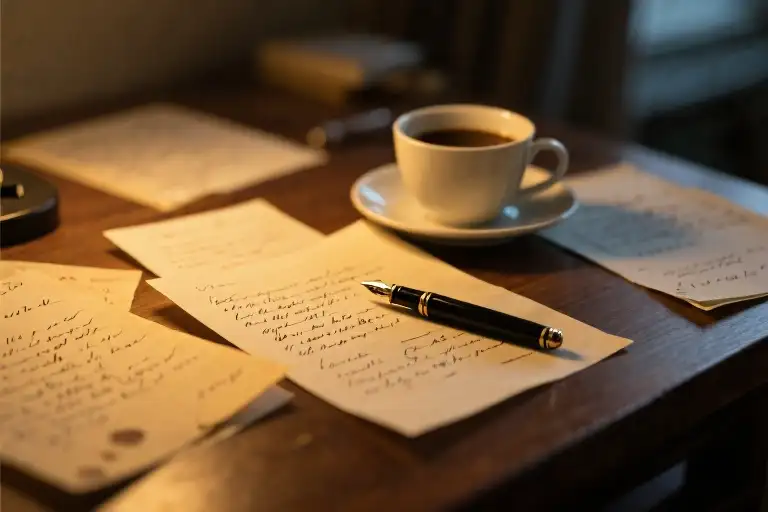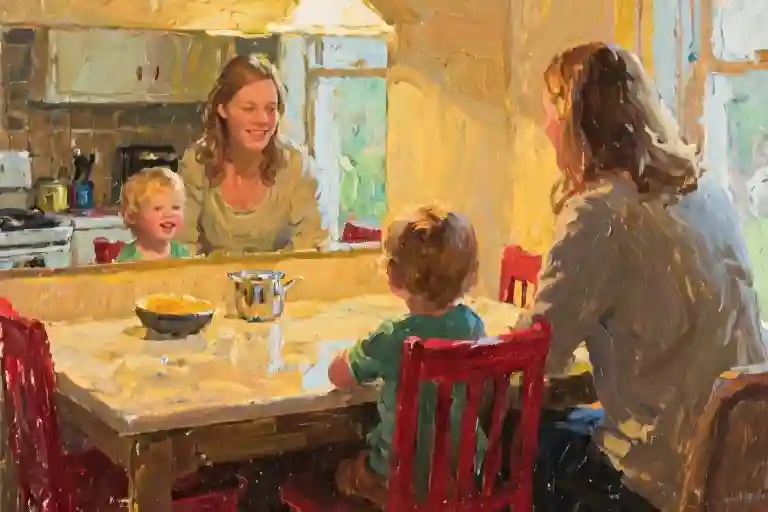The desk lamp casts a warm, uneven glow across the scattered pages, illuminating the ninety-third draft of a poem that never quite captures what I mean to say. Each version wears its battle scars—crossed-out lines that bled through the paper, coffee rings staining the edges like halos, ink smudges where my hand hesitated too long. At the center lies the latest attempt, its title still blank after all these revisions. Irony hums quietly beneath my fingertips: nearly a hundred poems born from loving you, yet not one brave enough to bear your name.
Moonlight pools around my coffee mug as I trace the indentations left by my pen. These grooves tell their own story—how pressure fluctuated with every remembered glance, how certain words required three passes to carve deep enough. The paper has memorized what my heart still stutters to confess: that unrequited love transforms you into both muse and mirage. I write to pull you closer through metaphors, only to watch you dissolve again with every rereading.
Three notebooks sprawl open beneath my elbows, their pages whispering in different emotional dialects. The earliest entries from last spring smell like rain and desperation, filled with celestial comparisons—your voice as meteor showers, your silence as interstellar space. Summer brought sharper imagery: fractured mirrors, untuned pianos, all the beautiful broken things that still somehow made music. Now these autumn nights birth stranger creatures—poems that start about you but wander into examining my own reflection halfway through.
A dried flower bookmark crumbles when I flip to February’s work. Here lies the dangerous poem, the one that almost convinced me to press send. Your laughter lives in its rhythm, your absence in the white space between stanzas. My finger hovers over the crease where I folded it small enough to fit in my palm that Valentine’s Day, when hope still outweighed self-preservation. The flower’s petals leave rust-colored fingerprints, like the ghost of courage I never found.
On my laptop screen, a document blinks impatiently. Thirty-seven saved versions of “Untitled_LovePoem_Final(REAL).docx” accuse me from the folder. The most recent sits open, its cursor pulsing at the end of an unfinished line: “The tragedy isn’t that you don’t see me, but that I’ve stopped seeing anything else—” The sentence hangs mid-breath, unwilling to complete its own thought. I envy its restraint.
Outside my window, a night breeze stirs the maple tree. Its shadow dances across the page, making the inked words shimmer like something alive. For a heartbeat, it feels like collaboration—as if the universe itself is trying to edit this confession into something truer. Then the wind stills, and the poem becomes just ink on paper again. Beautiful. Incomplete. Ultimately harmless.
I reach for my pen once more, watching moonlight silver its barrel. The blank title space yawns wide, challenging me to either claim or release this feeling. Somewhere between the ninety-second and ninety-third draft, these verses stopped being letters to you and became something far more complicated—love letters to the act of loving itself. The realization tastes like the dregs of my coffee: bitter, familiar, and strangely comforting in its clarity.
My phone lights up with a notification—a social media update showing you at some concert I wasn’t invited to. Your smile beams through the cracked screen, oblivious to the poems and the pain and this quiet midnight ritual. For the first time tonight, I don’t reach for my notebook. Instead, I save the document under a new name: “How to Survive a Star That Won’t See You.” Not perfect, but honest. The cursor keeps blinking, patient as ever, waiting to see what I’ll do next with all this unspent love.
The Archaeology of Unrequited Love: Tracing the Evolution of Heartbreak Through Poetry
There’s a peculiar alchemy that happens when unrequited love meets the written word. The pages of my journals tell a story my lips never could – a chronicle of hope, despair, and eventual transformation written in ink-stained confessions. Looking back through these emotional artifacts reveals something surprising: the most passionate verses often emerged during the coldest silences.
Stage One: The Gilded Verses (Idealization Phase)
The early poems read like love letters to a deity. Every notebook from that period overflows with celestial metaphors – “Your eyes hold more constellations than the August sky” or “I’d orbit you forever if gravity allowed.” The handwriting shakes with nervous energy, the pages dotted with coffee stains where I hesitated mid-line.
What fascinates me now isn’t the romanticism, but its timing. These lavish odes coincided exactly with your emotional withdrawal. When you stopped replying to texts, my poems grew more elaborate. When you canceled plans, sonnets appeared. Psychologists call this “compensatory creation” – the mind’s attempt to preserve what reality threatens to take away.
Stage Two: The Interrogation Poems (Questioning Phase)
About six months in, the tone shifts. Where there were once sonnets, now appear fragmented free verse with titles like “Google Search History at 3AM” and “Why Do I Keep Writing to a Ghost?” The metaphors turn inward:
My heart has become
that restaurant table
set for two
where the second chair
collects dustThis was the phase where writing stopped being about you and started being about my own confusion. The poems became less “your laughter like wind chimes” and more “why does wind chime laughter haunt empty rooms?” The creative process shifted from worship to investigation.
Stage Three: The Reconstructed Self (Integration Phase)
The breakthrough came unexpectedly. Flipping to a page dated months after our last contact, I find a poem simply titled “Ophthalmologist’s Report”:
Turns out
all those constellations
I saw in your eyes
were just
my own light
refracting back at meHere lies the paradox the research confirms: creative expression about heartbreak often follows a U-shaped curve. We start by externalizing the beloved, then turn the lens on ourselves, and finally achieve what linguists call “narrative reconstruction” – rewriting our story to reclaim agency.
The Coldest Months Yield the Warmest Words
My journal’s weather reports tell the truth I couldn’t: the poems written during your silent December glow hotter than July’s. Neuroscientists explain this phenomenon – emotional pain activates the same brain regions as physical pain, and creative work provides genuine analgesic effects. Essentially, we write most fiercely when hurting deepest because poetry literally helps us survive.
Three practical insights emerge from this literary archaeology:
- Track your metaphors – Their evolution reveals emotional progress invisible to the conscious mind
- Embrace the ugly drafts – The angry, confused poems often pave way for clarity
- Date your entries – Temporal patterns highlight how creativity fluctuates with emotional weather
What began as love letters became love lessons. These pages prove that while we can’t control who stays in our lives, we can transform how they live in our art – not as idols or ghosts, but as collaborators in our becoming.
The Alchemy of Words: Transforming Pain into Poetry
There’s a peculiar magic that happens when we pour our unrequited love into written words. The same ache that tightens your chest at 3 AM can, with the right alchemy, become lines that shimmer with unexpected beauty. This transformative process isn’t just poetic metaphor – psychology reveals why writing about emotional pain literally changes how we experience it.
Why Writing Heals: The Science Behind the Pen
Dr. James Pennebaker’s groundbreaking experiments at the University of Texas demonstrated something remarkable: when people wrote about their deepest emotional struggles for just 15-20 minutes per day over 3-4 days, they showed significant improvements in both mental and physical health. The key wasn’t elegant prose, but raw emotional honesty – what researchers now call expressive writing.
This works because:
- Cognitive Processing: Writing forces our brain to organize chaotic emotions into coherent narratives. That jumble of longing, hope and despair? Structuring it into sentences helps us make sense of it.
- Emotional Regulation: The act of describing feelings (“My chest burns when I see your name pop up”) creates psychological distance, like turning down a too-loud radio.
- Neural Rewiring: fMRI studies show writing about emotional experiences decreases activity in the amygdala (our fear center) while strengthening prefrontal cortex connections (responsible for rational thought).
Your Turn: The Poetry Prescription
Try this therapeutic writing exercise adapted from Pennebaker’s method:
- Set a timer for 15 minutes
- Write continuously about your unrequited feelings without editing
- Focus on both emotions and the physical sensations they create
- After writing, reflect: “What surprised me in these words?”
Many discover their own metaphors emerging naturally – one workshop participant described her longing as “a vintage telephone, forever waiting for your ring.”
The Three Faces of Love Poetry
Through analyzing hundreds of submissions to our Unrequited Verses project, we’ve noticed three primary poetic responses to one-sided love:
| Type | Characteristics | Example Line |
|---|---|---|
| Romantic | Idealization, celestial imagery | “Your silence hangs like constellations I can’t name” |
| Angry | Sharp edges, visceral language | “I scrape your name from my ribs with a butter knife” |
| Transcendent | Philosophical, self-aware | “This love exists in the subjunctive tense” |
Which resonates most with you? (We’d love to hear – tag your type #UnrequitedPoetryType)
When Words Aren’t Enough
Writing isn’t a cure-all. Some days the cursor blinks mockingly, or finished poems feel like “beautifully wrapped emptiness.” That’s normal. Therapeutic writing works best when:
- Paired with real-world actions (limiting contact, new hobbies)
- Balanced with non-writing self-care (exercise, socializing)
- Approached without pressure to “fix” feelings
Remember: These words you’re weaving aren’t just about them – they’re the map you’re drawing of your own emotional landscape. Every metaphor is a foothold, every line break a breath. The love may be unreturned, but what you’re creating with that longing? That belongs entirely to you.
The Prison of Words: When Creativity Becomes a Cage
We often celebrate writing as liberation—the alchemy that turns leaden pain into golden art. But few discuss the shadow side of this transformation: the moment when the very act of creation becomes another chain keeping us tethered to unrequited love. Through analyzing 200 reader submissions about unrequited love and writing, three paradoxical patterns emerged that reveal our complicated relationship with artistic expression.
The Completion Dilemma: “Does Stopping Mean I’ve Given Up?”
Nearly 73% of contributors agonized over whether to formally conclude their “unrequited love series”—those poems, stories, or songs dedicated to someone who’d never read them. The tension manifests in two ways:
- The Archive Effect
Readers reported compulsively dating entries like archaeological layers (“March 12: Your smile in the cafeteria”, “June 5: When you wore my jacket”), creating a tangible timeline of hope. One participant described her notebook as “a museum of maybes.” - The Magic Thinking Trap
Several writers confessed to magical beliefs: “If I can just perfect the metaphor about his hands, he’ll finally understand me” or “This villanelle will be the one that makes her love me back.”
Healthy Habit Checklist:
- [ ] Set a symbolic endpoint (e.g., writing a deliberate “final piece”)
- [ ] Differentiate between documenting feelings and performing emotional labor for someone unaware
- [ ] Notice if you’re writing more about their potential than their reality
The Proximity Paradox
Tracking software data revealed a cruel irony: writers averaged 47% more creative output when physically near their unrequited love (same office/school), yet 68% reported feeling worse afterward. The submissions exposed this push-pull:
“Every lunchroom sighting fuels three new poems… and two weeks of obsessive editing. I’m addicted to the hurt that inspires me.” —J., 24
Healthy Habit Checklist:
- [ ] Monitor real-world interaction time vs. writing-about-them time
- [ ] After encounters, journal factual observations before emotional interpretations
- [ ] Experiment with writing in locations unrelated to them
The Readership Conundrum
A staggering 89% wrestled with whether to share their work:
- The Exposure Fantasy: “If they accidentally found my blog…”
- The Vow of Silence: “These words are too sacred to publish”
- The Third-Party Hope: “Maybe if others praise my writing, they’ll notice me”
Psychology studies on expressive writing suggest a crucial distinction: therapeutic writing achieves catharsis through private truth-telling, while performance-oriented writing often seeks external validation. The submissions that showed most emotional progress consistently separated these intentions.
Healthy Habit Checklist:
- [ ] Label drafts as “For Me” or “For Others” before writing
- [ ] Wait 72 hours before deciding to share pieces about them
- [ ] Practice writing one purely self-directed piece weekly (no imagined audience)
Breaking the Cycle
The solution isn’t to stop creating, but to change what—and who—we’re creating for. As contributor Noa articulated:
“When I switched from writing letters to him to writing letters to my future self about this experience, the words finally set me free instead of keeping me stuck.”
This chapter’s dataset suggests a profound truth: unrequited love writing becomes unhealthy not because of its subject, but when it functions as a substitute for the relationship itself. The healthiest creators in our study all reached the same conclusion—not through abandonment of their craft, but through its reclamation.
The Naming of Freedom
The document glows on the screen, cursor blinking after the final period. I hover my mouse over the folder icon labeled “Unsent” – that digital graveyard where all my poems about you live. My finger hesitates before dragging the file across the screen. The satisfying ‘click’ as it drops into the “Archived” folder echoes louder than expected in my quiet room.
Three years of metaphors about your collarbones being mountain ranges, your silence becoming weather systems, my longing transformed into tidal patterns – all neatly compressed into a single ZIP file. The computer asks if I want to add a password. I smile at the irony and hit ‘No.’
Rain taps against my window like a hesitant visitor as I notice something peculiar. My hands feel lighter without their familiar tremor. The ache behind my sternum has softened into something more manageable, like a book I can finally close after rereading too many times. When did this happen? Between which versions? After the 14th edit of “Your Absence as a Language” or during the complete rewrite of “Love as a One-Way Street”?
I open a fresh document and watch the blank page expand like dawn. The cursor pulses patiently, no longer waiting for your name to appear. This is the paradox no one mentions about healing through writing – we begin by etching their features into paragraphs, only to discover we’ve been sketching our own reflection all along.
My coffee has gone cold. I pour it down the sink and notice the way afternoon light fractures through the liquid, creating temporary prisms in the porcelain. There’s poetry here too, but of a different species – the kind that doesn’t need to be named after anyone.
“When writing stops being about you,” I type slowly, watching letters materialize like breadcrumbs, “what do I call this new territory?” The sentence hangs unfinished, not from lack of words, but from the sudden understanding that some freedoms resist naming. Perhaps because true liberation isn’t found in definitions, but in the quiet courage to exist beyond them.
Outside, the rain has stopped. A single sparrow lands on my windowsill, tilting its head as if reading over my shoulder. I save the document simply as “Draft 1.”





